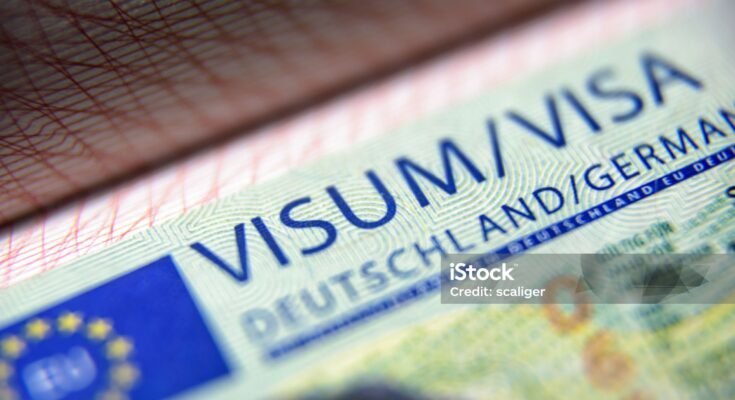Germany Job Seeker Visa 2025
1. 🧾 What Is It (in 2025)?
- The Job Seeker Visa is a 6-month national visa for non‑EU/EEA/Swiss citizens that permits you to enter Germany and search for skilled employment related to your qualifications — no prior job offer required (VisaXtra).
- Completed in July 2023, Germany’s Skilled Workers’ Act expanded skilled immigration pathways and introduced the Opportunity Card (“Chancenkarte”), a points-based job seeker visa up to 12 months, with part-time work permission (up to 20h/week) (Wikipedia, Wikipedia).
2. ✅ Eligibility & Requirements
Job Seeker Visa:
- Nationality: Non‑EU/EEA unless from visa-exempt states like the US/Canada, where other permits are possible (VisaXtra).
- Education: Bachelor’s or higher from a recognized institution; foreign degrees must be recognized via Anabin or a ZAB statement (Best Migration Consultant).
- Work Experience: Typically 5 years in your field, though exceptions may exist (lawmenguide.com).
- Financial Proof: Blocked account (“Sperrkonto”) with around €1,027/month (≈€6,162 total) or a sponsor declaration (“Verpflichtungserklärung”) (How-to-Germany.com).
- Insurance: Schengen travel health insurance (covering at least €30,000), valid for the visa duration (How-to-Germany.com).
- Language: Not mandatory, but German A1 or English B2 can improve prospects (Best Migration Consultant).
Opportunity Card (“Chancenkarte”):
- Requires points based on education, experience, age, language, previous stays, and occupation in a shortage field.
- Valid for up to 12 months, work limited to 20 hours/week + short trial periods (Wikipedia, West Highlander, Wikipedia).
3. 📄 Application Process
- Confirm eligibility (degree recognition, experience, funds, language).
- Prepare documents: passport, photos, CV, motivational letter, degree/recognition, blocked account proof, insurance, travel/accommodation evidence (Best Migration Consultant).
- Apply at German Embassy/Consulate or visa center; submit forms, biometrics, pay €75 fee (UpGrad).
- Processing takes 4–8 weeks, so apply early (UpGrad).
- On arrival: register at Einwohnermeldeamt, then continue job search or convert once you find employment (lawmenguide.com).
4. ⚖️ Rights and Limitations During Stay
Job Seeker Visa:
- No full-time work permitted; limited trial work up to 10 hours/week is allowed (Germany Visa).
- Despite no “Zusatzblatt”, some holders report being able to work full-time — AI interpretations vary, but legally only trial work is expected (Reddit).
Opportunity Card:
- Allows paid work up to 20 hours/week and short trials; some employers may be hesitant to hire due to limited awareness of the visa type (Reddit).
5. 🔄 Converting After a Job Offer
- Once you find a job aligned with your qualifications, you can apply for:
- A standard Work Visa
- Or the EU Blue Card, which for experts offers a streamlined route, dependent on salary thresholds and job field (jobs.betpaddi.com, lawmenguide.com).
- Application is made in Germany via the Ausländerbehörde, before your seeker visa expires (lawmenguide.com).
6. 📊 Summary Table
| Feature | Job Seeker Visa (2025) | Opportunity Card (Chancenkarte) |
|---|---|---|
| Grant duration | 6 months | Up to 12 months (possibly extendable) |
| Work allowed | No full-time (max ~10h/week unpaid) | Up to 20h/week + short trials |
| Eligibility | Degree recognized + ~5 years exp. | Points-based (degree/experience/language/etc.) |
| Financial requirement | ~€6,162 (blocked account) | ~€13,092 (blocked account) or sponsor |
| Insurance requirement | Travel health insurance | Same |
| Cost | €75 | €75 |
| Language requirement | Optional, helps: German A1 / English B2 | Same |
| Conversion on job | Yes — Work permit / EU Blue Card | Yes — subject to job qualifying |
7. 💬 Tips & Insights from Real Users
- On the Job Seeker Visa, many applicant accounts show working more than 10 hours/week — though this is based on experience, not formal rule (Reddit, Lastng Finance, LinkedIn, UpGrad, West Highlander, Best Migration Consultant, Reddit).
- The Opportunity Card is new (introduced mid‑2024), and many employers aren’t yet familiar with it. Companies like Amazon reportedly reject applicants due to uncertainty over visa implications and perceived limitations (Reddit).
- Skepticism arises online about the lack of positive success stories so far, especially from professionals arriving with only basic German (A1/B1) or limited experience (Reddit).
8. ✅ Final Advice
- ✅ If you hold a recognized degree and enough funds, the Job Seeker Visa (6 months) remains a reliable path for job hunting in Germany.
- ✅ The Opportunity Card may suit experienced professionals who meet the points system, but be aware of practical challenges with employers’ unfamiliarity.
- Prepare a strong CV, motivation letter, and consider learning basic German to enhance employment prospects.
- Once employed, convert promptly to a work permit or Blue Card to secure your stay.
Would you like help calculating your points for the Chancenkarte, drafting a motivation letter, or reviewing city/job-match strategies based on your background? Happy to assist!
